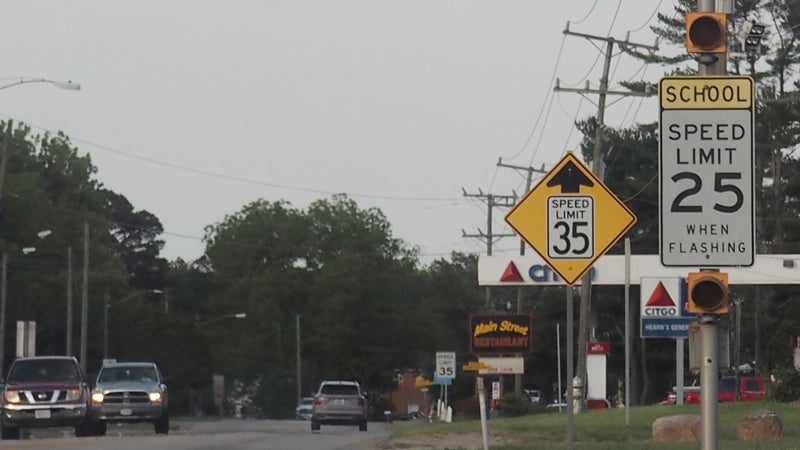Smithfield speed camera proposal lacks unanimous support
Published 6:10 pm Wednesday, May 24, 2023

- The speed limit outside Westside Elementary in Smithfield is 45 mph, which drops to 35 mph almost immediately, and 25 mph when the school zone sign is flashing. Isle of Wight County and Smithfield are each considering proposals to add automated speed enforcement cameras to school zone signs. (Photo by Stephen Faleski | The Smithfield Times)
The Smithfield Police Department is still proposing to spend roughly $3,500 per month to place an automated speed limit enforcement camera on the flashing school zone sign outside Westside Elementary, even though another camera vendor says it can do the same at no cost save for a portion of the fines speeders would pay.
Not every member of Smithfield’s Town Council, which would need to authorize the expenditure, is on board with the idea either.
The camera would track the speed of vehicles and photograph the license plates of any observed speeding. Virginia’s General Assembly, in 2020, authorized localities to impose fines of up to $100 on motorists caught on camera speeding through a school zone.
Maryland-based Altumint has quoted Smithfield’s Town Council an average $3,500-per-month cost for the proposed Westside camera, which would indirectly come out of the fines violators would pay.
Representatives of Altumint, which is presently working with Suffolk to install school zone speed cameras, have told Smithfield officials that installing the camera would carry no upfront cost to the town, and that should the monthly cost exceed the fines collected, the company would not bill the town for the overage.
Isle of Wight County is considering a competing proposal from Blue Line Solutions, a Tennessee-based company owned and operated by former law enforcement personnel, to place cameras outside schools in the county’s unincorporated areas. Randy Campbell, a former state trooper who’s now Blue Line’s regional senior adviser, told supervisors that $75 out of every $100 would come back to Isle of Wight as an additional source of government revenue, while Blue Line would collect the remaining $25.
Blue Line had also solicited the town but was rejected on Smithfield Deputy Police Chief Chris Meier’s contention that Blue Line’s collection method violates state law.
Meier, at a May 22 meeting of the Town Council’s committees, cited a provision of the 2020 law that states any agreement for compensation must be “based on the value of the goods and services provided, not on the number of violations paid or monetary penalties imposed.”
Jason Friedberg, vice president of sales and marketing for Blue Line, disputes Meier’s interpretation.
Splitting the fine from a speeding ticket would indeed be illegal under Virginia law, Friedberg confirmed, but “we do not do a revenue split,” he contends.
Friedberg, speaking to The Smithfield Times by phone on May 23, called the $25 cost a “processing fee.”
Smithfield Police conducted a speed study outside Westside from Feb. 6-10 and saw 638 vehicles, or roughly 13% of the 4,290 observed over the five days, exceed the school zone speed limit by 10 mph or more. West Main Street, where Westside is located, has a posted speed limit of 45 mph, which drops to 25 mph on school days from 8:30 a.m. to 9:05 a.m. and from 3:30 p.m. to 4:05 p.m.
Meier noted that if the town sees a similar number of weekly speeders once the camera is operational, Blue Line’s one-fourth share from the $100 fines would amount to roughly $15,000 per week, compared to the $3,500 per month Altumint quoted.
According to Police Chief Alonzo Howell, the stretch of West Main Street by Westside saw 15 crashes in 2020, 10 in 2021, 12 in 2022 and four so far this year. Over the same four-year timeframe, police have issued only 21 summonses to motorists caught speeding through the corridor.
What may be mitigating the number of observed speeding offenses, Howell said, is the regular presence of officers at Westside directing traffic as students are arriving and leaving. The school’s drop-off and pickup times frequently result in traffic backups on West Main Street.
Councilwoman Renee Rountree, however, isn’t inclined to support the camera proposal at present.
Based on the statistics Howell shared, Westside “doesn’t seem to be one of our top safety problems,” Rountree said, contending the camera to be more about “making money than keeping people safe.”
Meier, however, said the department is short-staffed and it’s often difficult to find officers available to direct traffic.
“The revenue is a plus, but it’s not the reason we’re proposing this,” he said.
Councilman Wayne Hall also isn’t fully on board with the idea. He’s worried Smithfield may develop a reputation as a “speed trap.”
“We don’t want that here in this place,” Hall said.
The council plans to table the matter until town staff confers with the county on the concerns Meier raised.





